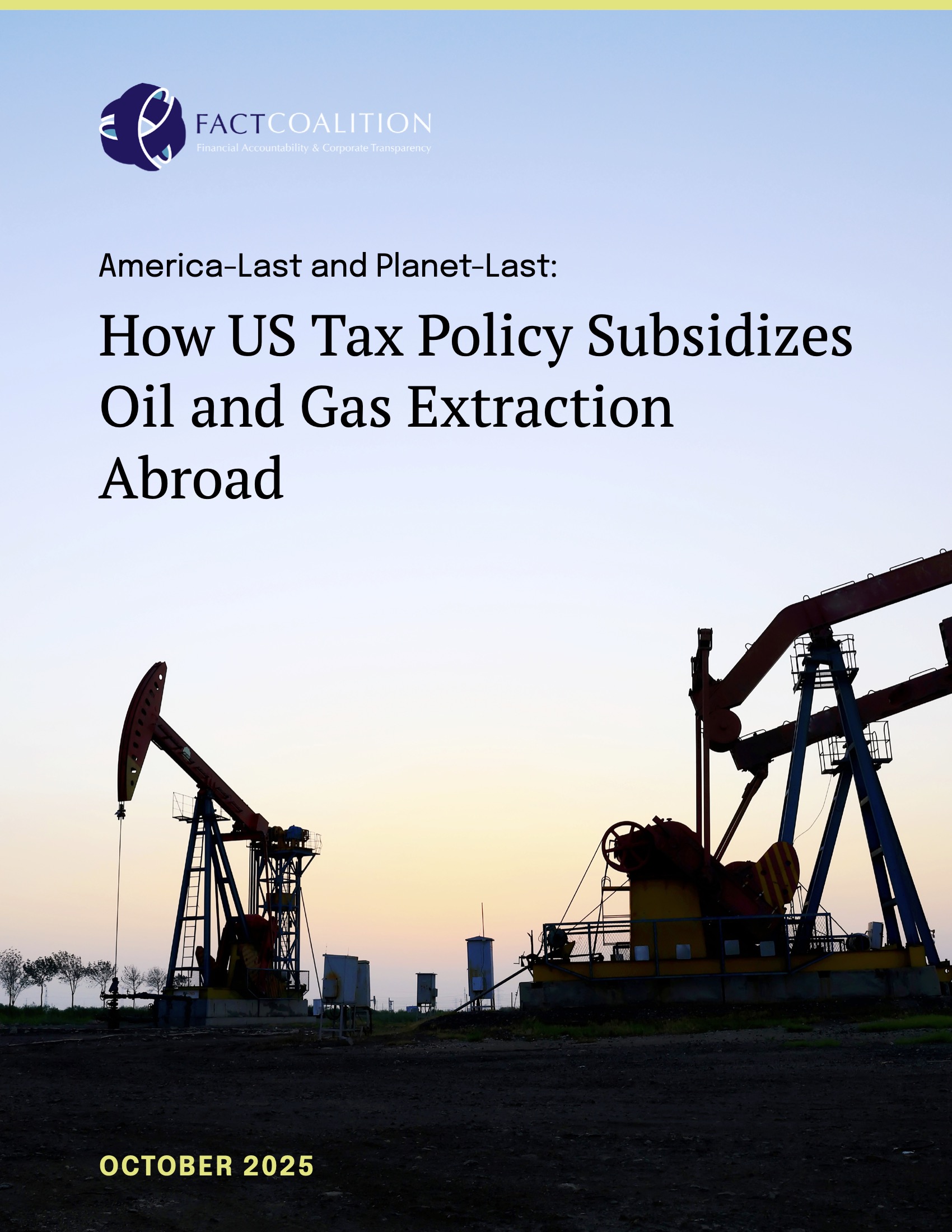US oil and gas companies continue to rely on industry-specific tax subsidies for fossil fuel production while lobbying for additional tax breaks. The fossil fuel industry continues to exert significant political power and influence, but it is not invincible. It will take leadership to end these America-last and planet-last tax policies.
Congress should repeal US subsidies for fossil fuel production at home and abroad, as laid out in the legislative proposals below.
Eliminate US domestic fossil fuel tax preferences
US Treasury budget analysis has identified $35 billion in tax preferences for domestic fossil fuels, including: immediate expensing of intangible drilling costs, use of percentage depletion for oil and gas wells, and others. On top of this, recent tax reform legislation in 2025 has added nearly $20 billion in further tax breaks for domestic fossil fuel companies. These tax breaks should be repealed, as proposed in the End Polluters Welfare Act (H.R. 4714, S. 2444) and End Oil and Gas Tax Subsidies Act (H.R. 383).
End US tax subsidies for fossil fuel production abroad
The US tax code is also generous in subsidizing oil and gas companies for their projects abroad. Such subsidies add up to nearly $75 billion, according to the most recent government estimates. To eliminate these international tax breaks, Congress must:
- End the favorable tax treatment of certain foreign fossil fuel income. This will be achieved by eliminating the exception for “foreign oil and gas income” (FOGEI) from the US minimum tax on foreign income (formerly known as GILTI) and treating “foreign oil related income” (FORI) as Subpart F income to ensure that it is taxable at the full corporate rate.
- Reduce the ability of oil and gas companies to exploit murky foreign tax credit rules by improving clarity. Currently, oil and gas companies have too much discretion in claiming tax credits for payments they make to foreign governments that are not necessarily consistent with normal income taxes applied to companies in other business sectors. Congress should close this loophole and draw a clear line to provide that oil and gas companies cannot claim more in foreign tax credits beyond what they owe under a generally applicable income tax.
Taken together, these changes would have the effect of making the tax treatment of foreign fossil fuel income more equal to domestic fossil fuel income, promoting US energy independence and national security. Recent polling shows that Americans overwhelmingly agree that “the US tax code should support US energy security, rather than subsidizing the development of foreign oil and gas projects.”
Reform the taxation of US companies’ foreign profits to discourage the abuse of tax havens and end the global race to the bottom on corporate taxes
The US tax code does not adequately address the risk of multinational corporations shifting profits to tax havens, including in the oil and gas sector. As such, US companies still have a substantial incentive to move profits to tax havens, denying much-needed revenues to the countries in which these corporations actually do business.
Congress should pass the No Tax Breaks for Outsourcing Act (H.R. 995, S. 409), a holistic legislative package that would address these deficiencies with the US international tax regime. Importantly, the reforms contained in the bill would not only increase the US minimum tax on companies’ foreign profits, but also make sure that they pay the minimum rate on profits in each country in which they operate, rather than on an aggregated basis.
Improve corporate tax transparency by mandating public country-by-country reporting
The Securities and Exchange Commission already has the authority to mandate full public country-by-country reporting for US multinationals, including oil and gas companies. Given significant investor demand and the substantial, material risks presented by aggressive tax avoidance across sectors, the Commission should move to mandate this reporting for all publicly-traded companies.
Barring independent action by the SEC, Congress should pass the Disclosure of Tax Havens and Offshoring Act (S. 638, H.R. 4938), which would require the Commission to advance a rulemaking on public country-by-country reporting, in line with international best practices.
Authors: Daniel Mulé, Thomas Georges, and Zorka Milin.
The authors would like to thank the following persons for their generous and helpful review: Kathleen Brophy, Patrick Driessen, Matthew Gardner, Ian Gary, Ryan Gurule, Erica Hanichak, Vincent Kiezebrink, Doug Koplow, Collin Rees, and others.
The recommendations and views expressed in this report are strictly those of the FACT Coalition and do not necessarily reflect the views of all of our members, our funders, or those who provided review.

